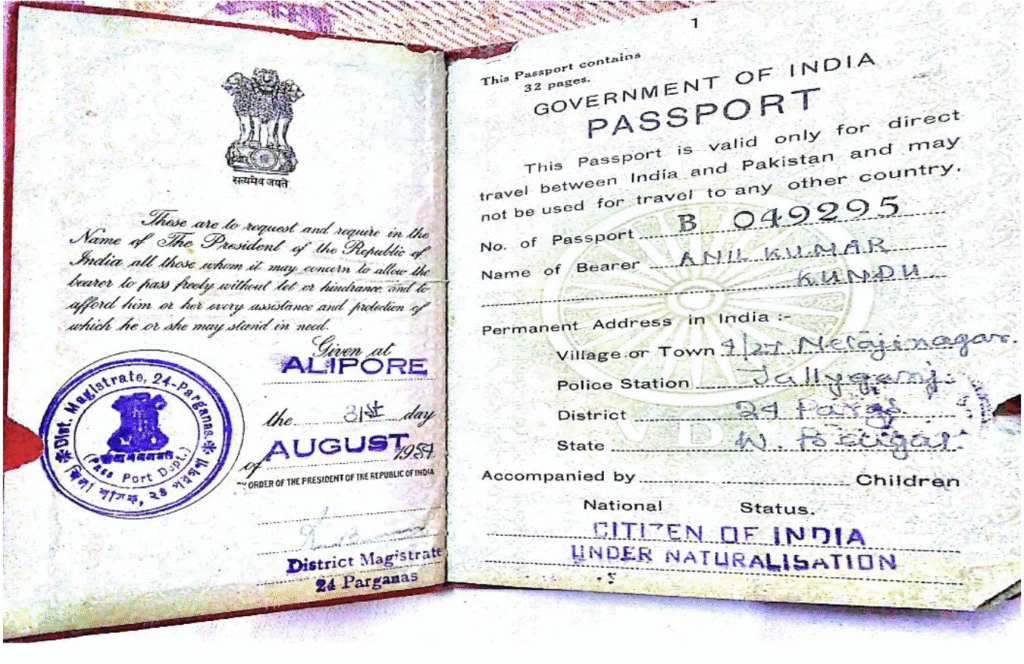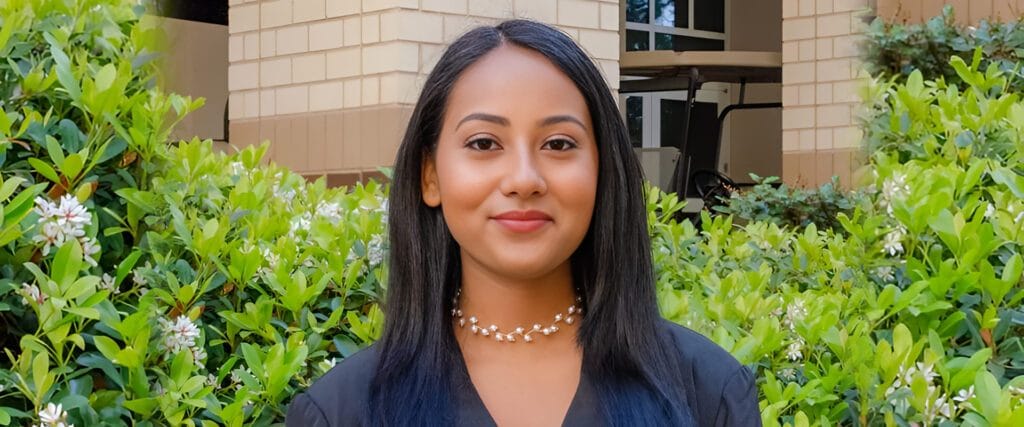Pictured: The 1952 passport issued to Anil Kumar Kundu. Image courtesy Sumallya Mukhopadhyay
Transcending Borders through Oral History
by Sumallya Mukhopadhyay
It is a well-established fact that the 1947 Partition of South Asia displaced a huge number of individuals and families who, after the redrawing of the cartographic map, sought refuge in regions where their co-religionists were the majority. The bifurcation affected two regions in particular – Punjab in the west and Bengal in the east, leading to large-scale movement of people across the borders in these two frontiers. In the following decades, the study of this historical division led to the establishment of the discipline of Partition Studies, which initially had an overt nationalistic tone, superseded thereafter by regionalism and memorialization of various kinds. The employment of oral history, however, had an enduring impact on the field of Partition Studies. For the simple reason that the individuated narratives foregrounded the subjective experiences and perceptions of people, focusing primarily on their episodic tales on displacement, migration, temporary relief, and permanent rehabilitation. Diverting from the archival documents and official papers that portrayed eyewitnesses as faceless, nameless numbers, oral history gave coherent shape to the voices of people who bore the brunt of the Partition.
Perhaps this is why I was drawn to the method of oral history when I embarked on examining how the Partition was revived, rehearsed, and represented in West Bengal. Growing up in a conventional, middle-class household, I was not unaware of the spectre of Partition. My mother’s side of the family traced its roots to erstwhile East Bengal (present-day Bangladesh), though their migration was unrelated to the events unfolding in and around 1947. The more I read about the Partition, the more I was interested in the life stories of individuals, who displayed exemplary fortitude and resilience against institutional negligence and apathy. As I commenced recording interviews of eyewitnesses, I could comprehend the zeitgeist of the period as well as realize that through the act of recollection, the narrators presented themselves as central characters in the stories, reflecting on their personal disappointments and struggles. In order to substantiate some of the stories, the narrators would refer to letters written by their friends, show monochromatic photos of family members, dig out their school/college certificates, and offer letters related to their jobs, among other material items. In one such oral history interview with Anil Kumar Kundu, whose life story I recorded in 2018, he talked about possessing two passports. Anil was around thirteen years old when the decision to divide the countries took place in 1947. He did not migrate to West Bengal till 1950, completing his education in the newly formed state of East Pakistan. After migrating across the borders, he obtained a special passport that was released in 1952 to facilitate travels exclusively between India and Pakistan. Childishly smiling, Anil said, “I have a special passport. I can show you. The passport was meant for travelling between India and East Pakistan though I never used it. However, I still have it.” By evoking the passport, Anil discussed how he wanted to visit his ancestral land that fell under the Madaripur sub-division in present-day Bangladesh. For familial reasons, Anil never found time to go back to Madaripur as the onus of resettling the family fell on his shoulders. The passport embodied his unfulfilled wish to visit his childhood home in East Bengal.
I had read about the 1952 passport in the literature associated with the Partition. It was introduced in October 1952 as part of the India–Pakistan Passport and Visa Scheme. To read about a document was one thing; to feel it on my hands served as a revelation. It firmly attested to my belief in oral history. After all, the interview made it possible to resuscitate this significant document from the closet where it was buried with other papers that belonged to Anil Kumar Kundu’s family. I never came across anyone else who had this passport till I listened to the interview of Ahmed Ilias, which is conserved in the digital repository of the 1947 Partition Archive. On behalf of the archive, Ahmed was interviewed by Farhana Afroz in 2012 in Dhaka, Bangladesh. During the interview, he talked about his Bihari identity. Quite ironically, he said, “My mother died after giving birth to me. Our Bengali neighbors were childless; they decided to adopt me. So, I am a Bihari Muslim adopted by Bengalis.” As I carefully listened to the interview, playing some of its parts again and again, I realized that he intentionally concentrated on the ‘Bihari’ identity, for his life as a poet and activist was centered on the Urdu-speaking Muslim community stranded at the camps in Bangladesh after 1971. In 1947, he chose to migrate to the eastern wing of Pakistan. After receiving words from his acquaintances in Dhaka, he decided to leave India and permanently settle in East Pakistan. In official parlance, the non-Bengali Hindu/Muslim refugee who migrated from India to East Pakistan was termed a ‘returnee’. If one got classified as a ‘returnee’, s/he could pray for government support in terms of shelter and work in Pakistan. Since Ahmed migrated in 1950 (the same year as Anil Kumar Kundu), he was not recognized as a ‘returnee’. He shifted back to India soon after. After securing the 1952 passport, he again visited East Pakistan. He used the passport to cross the borders several times before settling down in East Pakistan in 1953. Ahmed worked as a journalist till 1971 in East Pakistan. After the liberation of Bangladesh, his application to go to [West] Pakistan was rejected. So, he single-mindedly dedicated himself to the growth and upliftment of the ‘Bihari’ Muslims in Bangladesh.
Unlike Anil Kumar Kundu, Ahmed Ilias did not show his passport to the interviewer, Farhana. His uninterrupted, emotionally charged narration of events depicted his urge to record his life story, which in itself was quite important because it shed light on the plight of individuals and families who were rendered stateless in Bangladesh. Though the trajectories of their lives were entirely different, I could immediately place Anil alongside Ahmed because they shared a common historical document that transcended the ideological normative of nation and nationalism. The document, moreover, acted as a catalyst, and it helped them direct the course of their narrative before the recorder.
What I have briefly done here is showcased in a more concrete manner in the digital repository of the 1947 Partition Archive. By placing the life stories of Indians, Pakistanis, and Bangladeshis next to each other, the archive has strived to create a collective memory of the Partition. The oral history narratives are distinct in their appeal and content. More importantly, the narrators address one particular historical event. As we familiarize ourselves with their stories, we understand that in our recollection of the past, we are, after all, not unlike each other.
Sumallya Mukhopadhyay is the recipient of the TATA Trusts – Partition Archive Research Residency Grant (2021). At present, he is the Joint Secretary of the Oral History Association of India and teaches at the Department of Humanities and Social Sciences, National Institute of Technology, Silchar, Assam, India.



